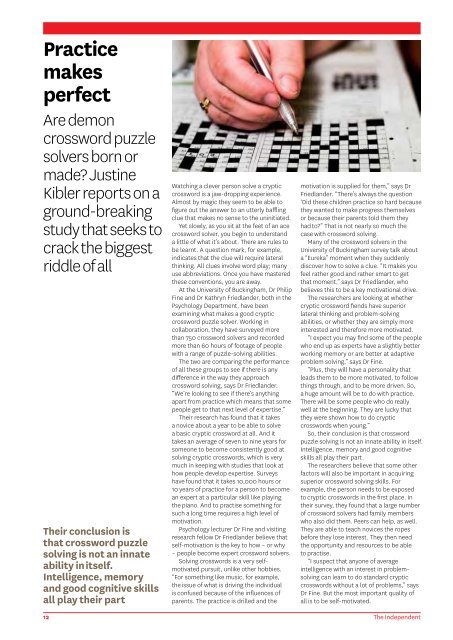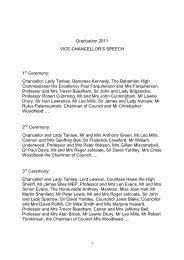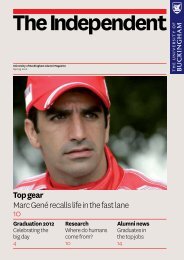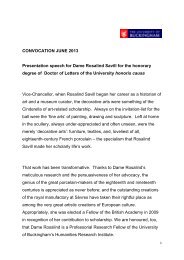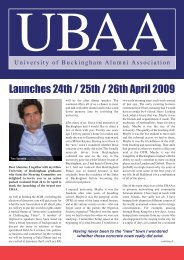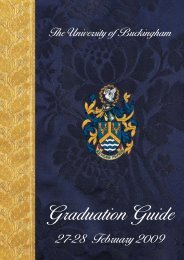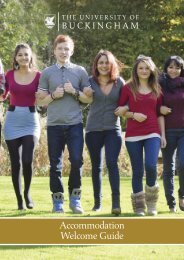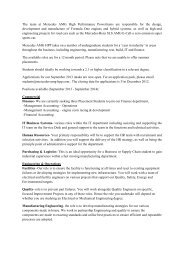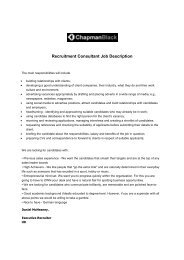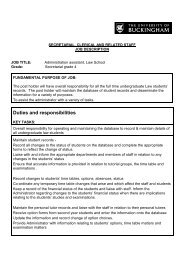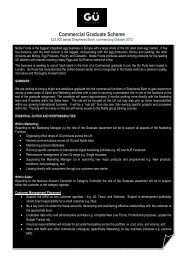Spring 2012 - University of Buckingham
Spring 2012 - University of Buckingham
Spring 2012 - University of Buckingham
You also want an ePaper? Increase the reach of your titles
YUMPU automatically turns print PDFs into web optimized ePapers that Google loves.
PracticemakesperfectAre demoncrossword puzzlesolvers born ormade? JustineKibler reports on aground-breakingstudy that seeks tocrack the biggestriddle <strong>of</strong> allTheir conclusion isthat crossword puzzlesolving is not an innateability in itself.Intelligence, memoryand good cognitive skillsall play their partWatching a clever person solve a crypticcrossword is a jaw-dropping experience.Almost by magic they seem to be able t<strong>of</strong>igure out the answer to an utterly bafflingclue that makes no sense to the uninitiated.Yet slowly, as you sit at the feet <strong>of</strong> an acecrossword solver, you begin to understanda little <strong>of</strong> what it’s about. There are rules tobe learnt. A question mark, for example,indicates that the clue will require lateralthinking. All clues involve word play; manyuse abbreviations. Once you have masteredthese conventions, you are away.At the <strong>University</strong> <strong>of</strong> <strong>Buckingham</strong>, Dr PhilipFine and Dr Kathryn Friedlander, both in thePsychology Department, have beenexamining what makes a good crypticcrossword puzzle solver. Working incollaboration, they have surveyed morethan 750 crossword solvers and recordedmore than 60 hours <strong>of</strong> footage <strong>of</strong> peoplewith a range <strong>of</strong> puzzle-solving abilities.The two are comparing the performance<strong>of</strong> all these groups to see if there is anydifference in the way they approachcrossword solving, says Dr Friedlander.“We’re looking to see if there’s anythingapart from practice which means that somepeople get to that next level <strong>of</strong> expertise.”Their research has found that it takesa novice about a year to be able to solvea basic cryptic crossword at all. And ittakes an average <strong>of</strong> seven to nine years forsomeone to become consistently good atsolving cryptic crosswords, which is verymuch in keeping with studies that look athow people develop expertise. Surveyshave found that it takes 10,000 hours or10 years <strong>of</strong> practice for a person to becomean expert at a particular skill like playingthe piano. And to practise something forsuch a long time requires a high level <strong>of</strong>motivation.Psychology lecturer Dr Fine and visitingresearch fellow Dr Friedlander believe thatself-motivation is the key to how – or why– people become expert crossword solvers.Solving crosswords is a very selfmotivatedpursuit, unlike other hobbies.“For something like music, for example,the issue <strong>of</strong> what is driving the individualis confused because <strong>of</strong> the influences <strong>of</strong>parents. The practice is drilled and themotivation is supplied for them,” says DrFriedlander. “There’s always the question‘Did these children practice so hard becausethey wanted to make progress themselvesor because their parents told them theyhad to?” That is not nearly so much thecase with crossword solving.Many <strong>of</strong> the crossword solvers in the<strong>University</strong> <strong>of</strong> <strong>Buckingham</strong> survey talk abouta “Eureka” moment when they suddenlydiscover how to solve a clue. “It makes youfeel rather good and rather smart to getthat moment,” says Dr Friedlander, whobelieves this to be a key motivational drive.The researchers are looking at whethercryptic crossword fiends have superiorlateral thinking and problem-solvingabilities, or whether they are simply moreinterested and therefore more motivated.“I expect you may find some <strong>of</strong> the peoplewho end up as experts have a slightly betterworking memory or are better at adaptiveproblem solving,” says Dr Fine.“Plus, they will have a personality thatleads them to be more motivated, to followthings through, and to be more driven. So,a huge amount will be to do with practice.There will be some people who do reallywell at the beginning. They are lucky thatthey were shown how to do crypticcrosswords when young.”So, their conclusion is that crosswordpuzzle solving is not an innate ability in itself.Intelligence, memory and good cognitiveskills all play their part.The researchers believe that some otherfactors will also be important in acquiringsuperior crossword solving skills. Forexample, the person needs to be exposedto cryptic crosswords in the first place. Intheir survey, they found that a large number<strong>of</strong> crossword solvers had family memberswho also did them. Peers can help, as well.They are able to teach novices the ropesbefore they lose interest. They then needthe opportunity and resources to be ableto practise.“I suspect that anyone <strong>of</strong> averageintelligence with an interest in problemsolvingcan learn to do standard crypticcrosswords without a lot <strong>of</strong> problems,” saysDr Fine. But the most important quality <strong>of</strong>all is to be self-motivated.CulturalrevolutionCreative artist inresidence GrahamRoos outlines hisvision for the<strong>University</strong><strong>Buckingham</strong> is now thedestination choice <strong>of</strong>many students who bringwith them an edgydeterminationI produced and directed my first play at<strong>Buckingham</strong> in 1989 with a small grant fromthe drama society <strong>of</strong> the time. The playmade a little money and this encouragedme to continue writing and performing aftergraduating. Thanks to this small successI had the confidence to pursue a career inthe creative world and I always looked backat my days at <strong>Buckingham</strong> with greatfondness.Cut to 2009 and I have just enjoyed a briefresidency at The Royal Opera House in myguise as poet and am now at The House <strong>of</strong>Lords enjoying tea with <strong>Buckingham</strong> alumniand the Vice-Chancellor. I think he asked mewhat I did. I think I said I was a lecturer,writer and film maker. Ah! He replied. Butwhich one are you really? All <strong>of</strong> them I said– they are interlinked. Then you should comeand give a talk to our students. I think it wasthen that the words “do you have an artist inresidence at the university these days?”came tumbling from my lips. The VC saidno but he thought it a good idea – did I haveanyone in mind? As it happened yes I did…It is now <strong>2012</strong> and I have just completedmy first term as Creative Artist in Residenceat the Univeristy. It is odd to be back and yetsuperficially little seems to have changedfrom my time – except there are perhapsfewer shoulders pads and less big hair. Thesame pretty town greets me on arrival andI note with satisfaction the harmonious mix<strong>of</strong> international students on the universitygrounds. The OTM greets me and I see littlehas changed here – even the clock abovethe door in the refectory is the same onethat was there in the 1980s.And yet there is pr<strong>of</strong>ound change andit is happening right now. The <strong>University</strong> isexpanding, there are more home studentsthan ever, and this is having an impacton the cultural experience <strong>of</strong> student life.The <strong>University</strong> is now in the national leaguetables and not only doing all right butexcelling in many areas and making it intothe top ten in English, for example. Thereis a sense <strong>of</strong> pride among the students thatthey are attending one <strong>of</strong> the greateducational experiments <strong>of</strong> the late 20thand early 21st centuries – and there isthe feeling that anything is possible.One <strong>of</strong> the things that strikes me mostabout <strong>Buckingham</strong> today is the sheer“can do” attitude. <strong>Buckingham</strong> is now thedestination <strong>of</strong> choice <strong>of</strong> many students whobring with them an edgy determination.They are less willing to accept the statusquo and what they do not like they setabout changing – which is the true basisfor successful student life anywhere. Onegets the impression that the <strong>University</strong> ison the cusp <strong>of</strong> radical change and couldbecome the Number One destination <strong>of</strong>choice for students. It is not hard toenvisage a future <strong>Buckingham</strong> which thestudents have chosen in preference toBristol, London or Exeter. Sadly, when Iwas here in the late 80s there were no realsocieties, no central hub to the <strong>University</strong>– few, if any, <strong>of</strong> those poetry or debatingevents so taken for granted by moreestablished, conventional universities. Nowthere is an explosion <strong>of</strong> talent. The poetrysociety is bursting with ability. Last term Iorganised a poetry slam in the OTM and leda workshop on performance poetry. I hopeI speak for many when I say the eveningwas a huge success – so much so that anopen mic night has become a regular sloton Tuesdays.I am also launching a film competitionto be judged by a panel <strong>of</strong> BAFTA jurists andinternational film makers with the prize <strong>of</strong>a trip to Pinewood Studios, and hope thatthis will become an annual fixture in thestudent calendar.The Drama Society shows great promise.I have been pleased to have had a smallinvolvement with the renovation at theRadcliffe Centre where I produced my firstplay all those years ago. It will now providethe sort <strong>of</strong> studio theatre atmospherenecessary for undergaduate productions.Finally I would like to ask any alumnireading this – if you have anything culturalto <strong>of</strong>fer the <strong>University</strong> – whether it’scostumes or a poetry library, lighting,old film equipment – anything to expandaccess to the arts, please consider donatingit to us. You never know, it might helplaunch someone’s career.12 The Independent The Independent 13


